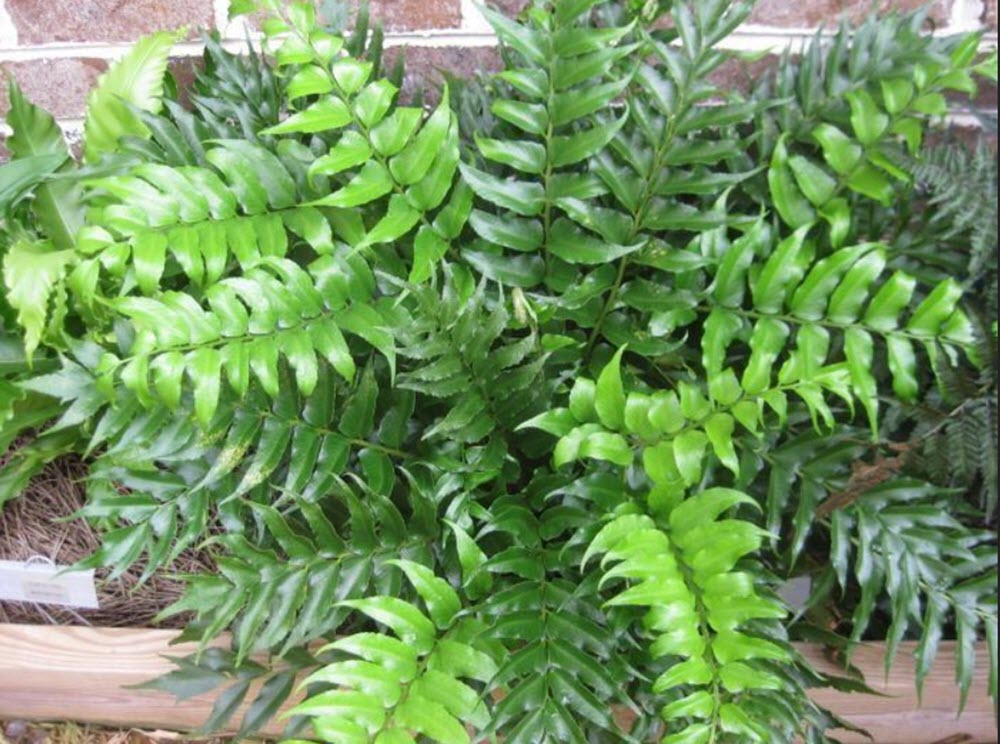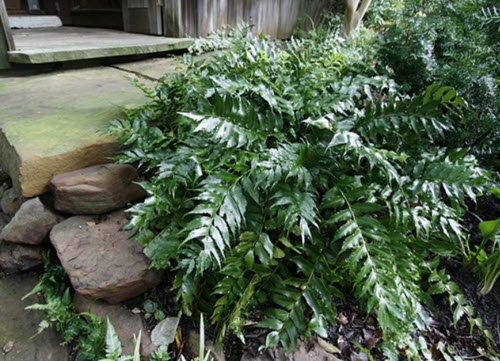Contents
Japanese Holly Fern has become a popular houseplant because it can handle dry air well and can be kept at room temperature year round. It is a decorative evergreen plant where the leaflets look similar to holly leaves, hence the name.
In warmer climates, Japanese Holly Fern is also a popular garden and porch plant in shaded areas. It is commonly combined with species from the genera Impatiens, Hosta and Caladium to create interesting filler beds in the shade.

Short info
Common names: Japanese Holly Fern, Holly Fern, House Holly Fern, Japanese Netvein Hollyfern
Family: Dryopteridaceae
Shape: Upright
Height: Up to 60 cm
Foliage: Green
Light: Bright but filtered is ideal
Humidity: High
Temperature: 16°C to 24°C during the active growth period, 10°C to 24°C during the resting period
Watering: moderately during the active growth period, sparingly during the resting period (IF the plant is kept an environment where it will go into resting)
Distribution and habitat
Cyrtomium falcatum is native to eastern Asia, where it inhabits moist environments. It is typically found on coastal cliffs, rocky slopes, crevices, and stream banks.
Humans have spread the species to other parts of the world and it can be found growing wild in places such as Lord How Island (Australia) and Hawaii (USA).
Description
The Japanese Holly Fern is an evergreen plant where the leaflets resemble holly leaves.
The rhizhome is covered in furry scurf, and this scurf also covers parts of the leafstalks that rise from the rhizhome. It is from these leafstalks that short leathery fronds develop, which can reach a length of 60 cm. The fronds are erect and each frond is divided into several pairs of leaflets.
Caring for a Japanese Holly Fern
Light and position
The Japanese Holly Fern likes bright but filtered light. It can survive in fairly poor light conditions, at least for a while, but it will be detrimental to the plant. Partial to full shade, with indirect bright light, is preferable.
Temperature
 This fern should ideally not be subjected to temperatures above 24°C.
This fern should ideally not be subjected to temperatures above 24°C.
During the active growth period, the temperature should be 16°C or above. During the resting period, it can tolerate temperatures down to 10°C.
If the temperature is above 20°C, give the fern extra air humidity. You can for instance place the pot on top of pebbles in a tray filled with water.
Watering
Water moderately during the active growth period, and sparingly during the resting period. Please note that if the fern is kept in a warm environment year round, it will not go into resting, and will require more water than resting plant. Resting occurs when the temperature falls below 12°C for more than few days.
When not resting, the plant needs to be watered when the potting medium has dried out somewhat.
Humidity
Compared to most other ferns kept as houseplants, the Japanese Holly Fern tolerates dry air well. It prefers when the air is a bit more moist, but it can tolerate dry air.
Soil
Japanese Holly Fern thrives in moderately fertile, humus-rich soil that can retain a bit of moist but drains quickly enough to not force the roots to stand in soggy soil.
Nutrients
When the plant is not resting, feed it with half-strength standard liquid fertiliser twice a month.
Repotting
It is time to repot when the roots have filled the pot.
When your fern is in an 18 cm pot, it is usually enough to top-dress annually with fresh potting medium instead of repotting, because the plant will not outgrow the pot.
